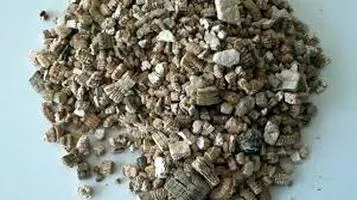Vermiculite: A Comprehensive Review
Vermiculite is a naturally occurring mineral that belongs to the phyllosilicate group, characterized by its layered structure and ability to expand when heated. This expansion process, known as exfoliation, transforms vermiculite from a dense, mica-like material into a lightweight, accordion-shaped aggregate. Due to its excellent thermal insulation properties, fire resistance, and lightweight nature, vermiculite is widely used in various applications, including construction, horticulture, and industrial settings. In construction, it serves as an insulating material and lightweight aggregate in concrete. In horticulture, its water retention and aeration capabilities make it ideal for soil conditioning and seed germination. Vermiculite is also utilized in packaging, as it cushions and protects delicate items. Its non-toxic and environmentally friendly profile further enhances its versatility and appeal.

Vermiculite is a versatile, naturally occurring mineral that has garnered substantial attention across various industries due to its unique properties. It is formed by the weathering or hydrothermal alteration of biotite or phlogopite. When heated, vermiculite expands significantly, a property known as exfoliation, which makes it incredibly useful for a wide range of applications. This review delves into the characteristics, uses, benefits, and potential drawbacks of vermiculite.
Characteristics and Properties
Vermiculite belongs to the phyllosilicate group of minerals, which also includes mica. It exhibits a layered structure that allows it to expand when subjected to high temperatures, typically between 300°C and 600°C. This expansion can be as much as 30 times its original volume, resulting in a lightweight, porous material.
The mineral is composed mainly of silicon, aluminum, magnesium, and iron, with a chemical formula often approximated as (Mg,Fe,Al)3(Al,Si)4O10(OH)2·4H2O. It is characterized by its high cation-exchange capacity, which allows it to retain and release nutrients and water effectively. This property is particularly beneficial in agricultural and horticultural applications.
Applications
Horticulture and Agriculture
One of the most prominent uses of vermiculite is in horticulture. Its ability to retain water and nutrients makes it an excellent soil conditioner. When mixed with soil or potting media, it enhances aeration and prevents compaction, which is crucial for healthy root development. Vermiculite is also pH-neutral, which ensures it does not alter the acidity or alkalinity of the soil.
Additionally, vermiculite is often used in hydroponic growing systems. Its lightweight nature and ability to retain moisture make it an ideal medium for growing plants in a soilless environment. It also helps in seed germination and cutting propagation by providing a sterile environment that minimizes the risk of fungal and bacterial infections.
Construction
In the construction industry, vermiculite is utilized for its insulative properties. When added to concrete, it improves thermal insulation and fire resistance. Vermiculite concrete is lightweight and can be used for roof and floor screeds, as well as in the construction of lightweight blocks and panels.
The mineral is also employed in the production of fireproofing materials. Its ability to withstand high temperatures without degrading makes it suitable for use in fire barriers and fireproof coatings for steel structures.
Industrial Applications
Vermiculite finds applications in various industrial processes. It is used as a packing material for hazardous chemicals due to its absorbent nature. In the automotive industry, vermiculite is incorporated into brake linings and clutch facings because of its thermal stability and frictional properties.
Moreover, exfoliated vermiculite is used as a carrier for pesticides, herbicides, and fertilizers. Its high surface area and porosity allow it to hold and slowly release these substances, enhancing their effectiveness and reducing the frequency of application.
Benefits
One of the primary advantages of vermiculite is its eco-friendliness. As a naturally occurring mineral, it is non-toxic and safe for use in various applications. Its ability to improve soil structure and retain moisture can lead to more efficient water use in agriculture, which is particularly important in arid regions.
Vermiculite's fire-resistant properties make it invaluable in enhancing the safety of buildings and industrial installations. Its use in fireproofing materials can significantly reduce the risk of fire-related damage and improve overall building safety.
In horticulture, vermiculite's capacity to retain nutrients and water can lead to healthier plants and higher yields. This can be particularly beneficial for organic farming practices, where the use of synthetic fertilizers and pesticides is minimized.
Drawbacks and Considerations
Despite its numerous benefits, vermiculite is not without its drawbacks. One of the most significant concerns is the potential contamination with asbestos, a known carcinogen. Some vermiculite deposits, particularly those mined from the Libby, Montana site in the United States, have been found to contain asbestos fibers. This has led to health concerns and regulatory scrutiny.
To mitigate this risk, it is crucial to source vermiculite from reputable suppliers who provide certification of asbestos-free products. Additionally, appropriate safety measures should be taken when handling and processing vermiculite to minimize the risk of inhalation of dust particles.
Another consideration is the cost. While vermiculite is generally affordable, the costs can add up when used in large quantities, particularly in industrial applications. Alternative materials, such as perlite, may be considered depending on the specific requirements and budget constraints.
Conclusion
Vermiculite is a remarkable mineral with a wide range of applications across various industries. Its unique properties, including high water retention, nutrient-holding capacity, and thermal stability, make it an invaluable resource in horticulture, construction, and industrial processes. However, it is essential to be aware of potential asbestos contamination and to source the material from reputable suppliers.
Overall, vermiculite offers numerous benefits that can enhance productivity, safety, and sustainability. As research and development continue, it is likely that new applications and improved processing techniques will further expand the potential uses of this versatile mineral.






